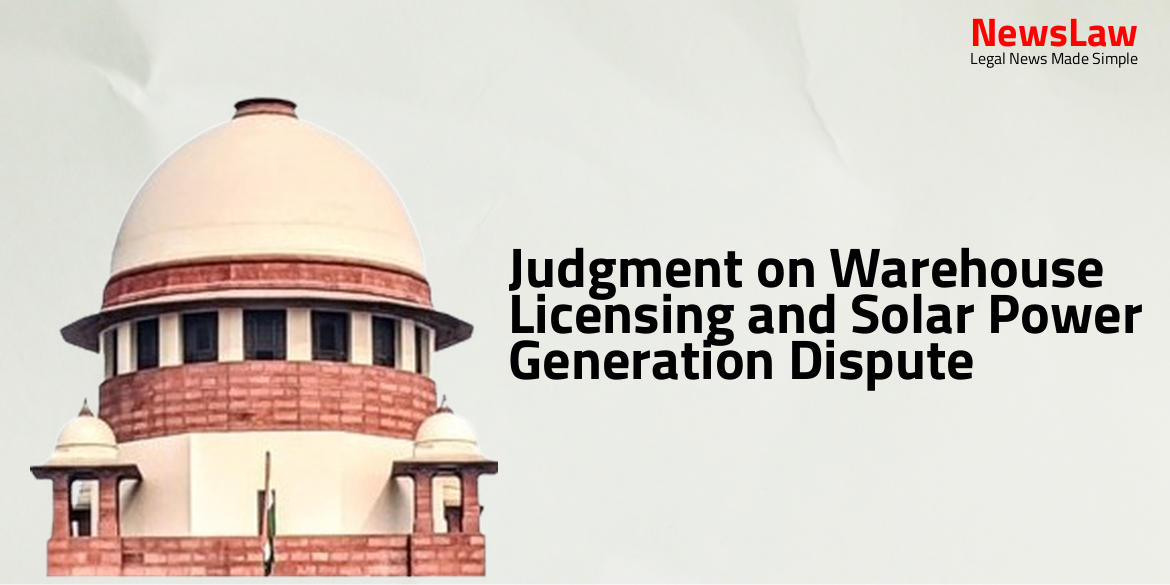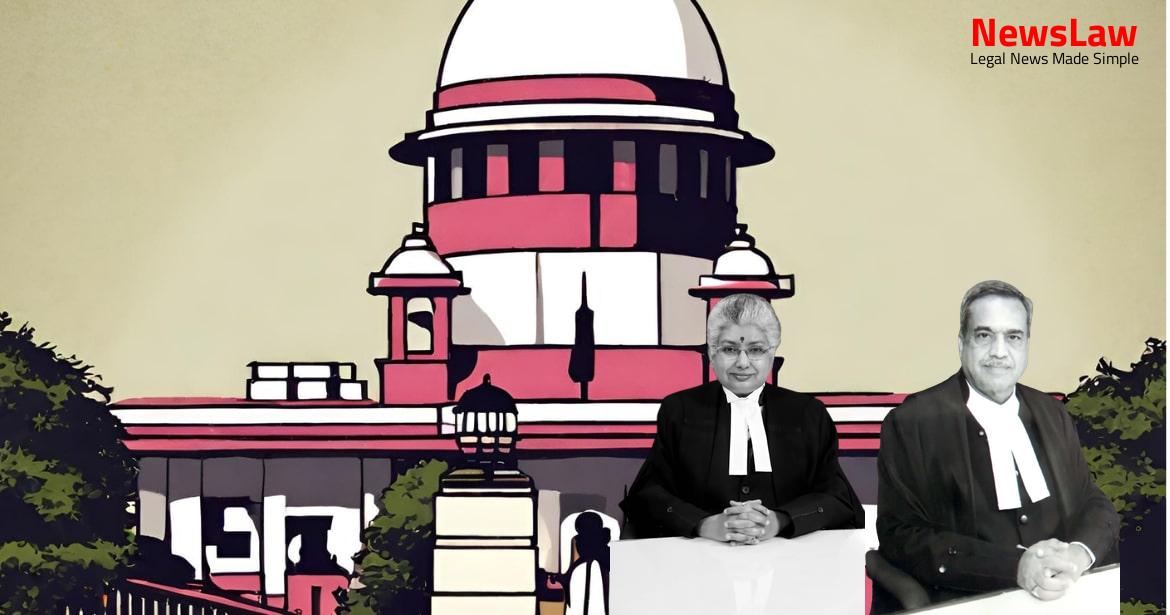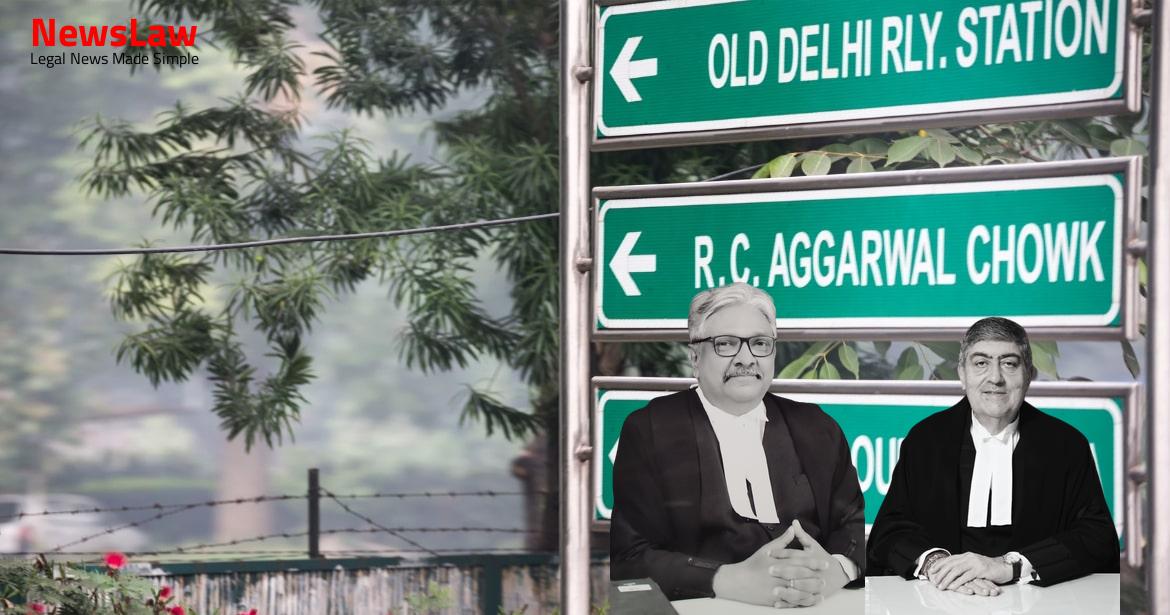In a significant legal development, the Delhi High Court has issued a vital judgment on the dispute concerning warehouse licensing and solar power generation. The case involves a detailed examination of Section 65 of the Act and its implications on the parties involved. Stay tuned for insights on the court’s ruling and its impact on the industry.
Facts
- The Facilitation of Advance Authorization and Compliance (FAC) unit was established to issue NOC or bond waivers for importers under certain conditions.
- The FAC unit was not intended to duplicate or undermine the existing mechanism for granting exemptions or waivers.
- The FAC unit has administrative autonomy in processing applications and making decisions based on the criteria laid down.
- The FAC unit’s decisions cannot be equated with the exercise of quasi-judicial powers by the Customs Department.
- The FAC unit’s functioning must be in line with the Customs Act and the Foreign Trade Policy.
- The FAC unit’s decisions may be challenged before higher authorities in case of grievances.
- After the imposition of BCD in 2022-23, there was a reduction in imports overall.
- However, there was an increase in the import of solar modules specifically in 2023-24.
- The data on import of solar modules is presented in the chart provided.
Issue
- Examination of whether Circular introduced a revenue legislation for imposing excise duty.
- Determination of whether the suits must relate to the recovery of possession of immovable property in Greater Bombay.
- Discussion on the need to reproduce Section 37-B of the Act in relation to the ambit of Section 37B.
- Key issue regarding the application of the dominant purpose test or the theory of apportionment in interpreting Section 14-A of the Act.
- Debate on the interpretation of the term ‘in relation to’ concerning the earning of dividend income on shares.
Arguments
- The petitioner contested that the cancellation of their license was invalid and void as they were not given the opportunity to avail themselves of the benefits of duty deferral as permitted under the Act.
- The Union Budget 2023-24 excluded solar power plants and projects from the purview of Project Imports, aligning with the Make in India and Atmanirbhar Bharat initiatives.
- The petitioner argued that the stand taken by the Board was unsustainable as there was no specific exclusion of electricity generation in Section 65.
- The learned counsel emphasized that the decision-making process required by the authority must adhere to certain legal standards and be subject to verification of facts with an opportunity for the affected parties to present their case.
- The submission highlighted the importance of warehouse storage, licensing, and permissions in relation to the Act, emphasizing the need for goods to undergo manufacturing or other operations to qualify for benefits under Section 65.
- It was contended that while the Act did not stipulate a time limit for warehousing capital goods, the MOOWR Regulations allowed duty to be paid only upon clearance for home consumption, demonstrating the deferment of duty until clearance.
- The argument was raised that the authority issuing the license was obligated to act judicially, following a quasi-judicial process for investigation and decision-making.
- The petitioner also challenged the imposition of customs duty on solar modules and cells, pointing out the evolving duty rates and exemptions.
- In conclusion, the petitioner requested a definitive ruling on the interpretation of Section 65 and the MOOWR Regulations in the context of their case.
- The respondents (ACME and AVAADA) raised concerns about the cancellation of their licenses by Customs authorities.
- They argued that the interpretation of Sections 61 and 65 of the Act by the learned ASG was contested.
- The respondents disagreed with the respondents’ stand on solar power generation not being permissible under Section 65 of the Act.
- They highlighted the objectives of schemes launched to promote domestic production of solar cells and modules.
- The respondents urged that the impugned Instruction was invalid and based on incorrect understanding of the relevant laws.
- They emphasized that capital goods could remain warehoused until they are cleared.
- The interpretation of the phrase ‘in relation to such goods’ was also challenged by the respondents.
Analysis
- The licensee must remove goods from the warehouse for export upon filing a shipping bill or a bill of export and affixing a one-time-lock to the means of transport.
- The licensee is required to take record of the goods removed from the warehouse.
- Different provisions apply depending on the type of goods cleared from the warehouse.
- The licensee must seek permission for manufacturing or other operations in the warehouse under section 65.
- Chapter VII of the Act deals with the clearance of imported and exported goods.
- Sections 47 and 48 of the Act pertain to the clearance of goods for home consumption and goods not cleared or warehoused within a specified timeframe.
- Section 65 of the Act allows for manufacturing and other operations in relation to goods in a warehouse with proper permission.
- Section 65A, although not enforced, relates to goods brought for operations in a warehouse having paid certain taxes.
- Regulations under the Act govern the operation and movement of goods in warehouses.
- The validity of permissions and licenses issued under the Act is subject to cancellation or surrender under specified conditions.
- The court emphasizes the need to interpret legislative language according to its plain grammatical and ordinary sense.
- The court must prioritize giving effect to the intention of the legislature as inferred from the language used in the statute.
- When the words in a statute are clear and unambiguous, resorting to other rules of interpretation is not necessary.
- In cases where statutory provisions are unambiguous, the court should not lean towards a different interpretation based on potential harsh consequences.
- The courts are required to give effect to clear legislative language, even if the results seem unjust or unpalatable.
- The judge should apply the literal meaning of the legislation unless it results in absurdity, repugnance, or inconsistency with the rest of the statute.
- Judicial restraint is essential, and judges should not engage in judicial legislation by modifying the express legislative language.
- Courts should not amend the law under the guise of interpretation and should adhere strictly to the literal rule of interpretation.
- The court should not circumvent or disregard statutory provisions based on hypothetical injustices that may not practically occur.
- Interpreting statutes in accordance with judicially presumed parliamentary concern for common sense and justice is essential to avoid statutory results that defy common sense and justice.
- Recreating or reassembling Section 65 to exclude a category of activity is deemed wholly incorrect.
- Provisional bond for release of goods cannot be demanded based on perceived negative impact on domestic industry.
- Any remedial measures for negative impact on local generators due to solar power generation under Section 65 should be left to the respondents.
- The court cannot use purposive interpretation to correct perceived anomalies in the impact of solar power generation on local generators.
- Issues pertaining to policy are not within the scope of the court’s authority to reconstruct a statutory provision.
- Introducing a condition of ineligibility in the garb of statutory interpretation is not permissible.
Decision
- The Instruction of the Board dated 09 July 2022 mandating review of existing licenses and follow-up action is quashed.
- The stay on the operation of the impugned Show Cause Notice (SCN) was confirmed and made absolute during the pendency of the writ petition.
- The writ petitions are allowed, and further observations are deemed unnecessary.
- The respondents’ contention in W.P. (C) 10838/2022 would not sustain based on the conclusions in the judgment.
- An amendment application was moved by the petitioner regarding the assailed SCN, marked as P. FINAL DETERMINATION 180.
- W.P.(C) 12386/2022 shall stand, and the parties will proceed as per the directions issued on this case.
Case Title: ACME DHAULPUR POWERTECH PRIVATE LIMITED Vs. CENTRAL BOARD OF INDIRECT TAXES AND CUSTOMS & ANR. (2024:DHC:3615-DB)
Case Number: W.P.(C)-10844/2022



